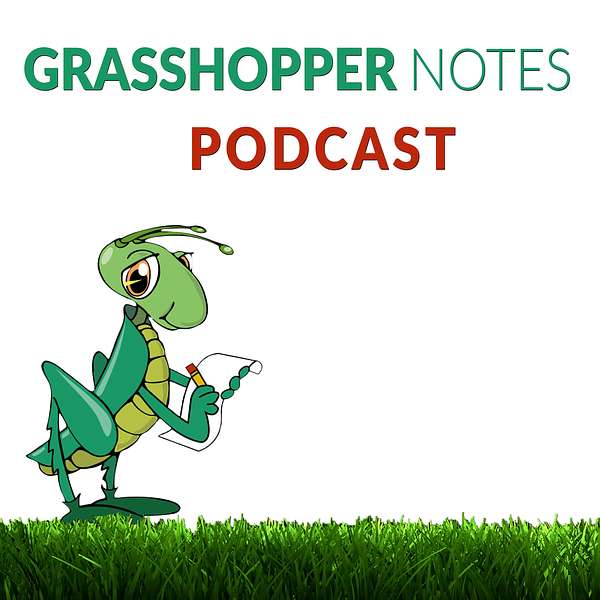
Grasshopper Notes Podcast
The Grasshopper Notes Podcast is hosted by John Morgan the man who has been billed as America’s Best Known Hypnotherapist.
John’s podcasts are a collection of guided meditations and bite-sized, mini podcasts which open you to new ways of thinking, communicating, and responding. You get a finer appreciation of how your mind works and how to use your internal resources to your best advantage.
See a video of John's background at the following link: https://www.youtube.com/watch?v=XbCPd00ok0I
In short, John Morgan is a people helper. Explore this channel and see what he can help you discover.
Grasshopper Notes Podcast
Don't Ask These Kind Of Questions
There's a certain type of question that's unproductive to ask. Find out what it is in this mini podcast.
Grasshopper Notes are the writings from America's Best Known Hypnotherapist John Morgan. His podcasts contain his most responded to essays and blog posts from the past two decades.
Find the written versions of these podcasts on John's podcasting site: https://www.buzzsprout.com/1628038
"The Grasshopper" is the part of you that whispers pearls of wisdom that seem to pop into your mind from out of the blue. John's essays and blog posts are his interpretations of these "Nips of Nectar." Others have labeled his writings as timeless wisdom.
Most of the John's writings revolve around self improvement and self help. They address topics like:
• Mindfulness
• Peace of mind
• Creativity
• How to stay in the present moment
• Spirituality
• Behavior improvement
And stories that transform you to a wider sense of awareness that presents more options. And isn't that what we all want, more options?
John uploads these podcasts on a regular basis. So check back often to hear these podcasts heard around the world. Who wants to be the next person to change?
Make sure to order a copy of John's new book: WISDOM OF THE GRASSHOPPER – 21 Days to Creativity. These mini-meditations take you inside where all your creative resources live. And you'll come out not only refreshed but recommitted to creating your future.
It's only $16.95 and available at BLURB.COM at the link below. https://www.blurb.com/b/10239673-wisd...
Also, download John's FREE book INTER RUPTION: The Magic Key To Lasting Change. It's available at John's website https://GrasshopperNotes.com
Don't Ask These Kind Of Questions
Ever notice how many “conversation starter” questions we ask . . . and how often we don’t really listen to the answer?
It happens all the time. We throw out things like “How was your day?” or “How was school?”— and honestly, we’re already halfway tuned out. If I could sum it up in one simple rule, it would be this: If you’re not interested in the answer, don’t ask the question.
One of the biggest obstacles to real communication isn’t a lack of talking—it’s a lack of paying attention.
Think about it: when we ask questions we already know the answer to—or ones we’re not emotionally invested in—the other person usually picks up on that. It comes off as insincere. Their response tends to be just as flat as your question. And what you’re left with are words that just kind of . . . float past each other.
Quick story. About 20 years ago, I ran into a woman I’d dated back in high school. We hadn’t seen each other in ages, and as we caught up, she told me something interesting she used to do with her kids. Instead of the usual “So, how was your day?”, she’d ask, “What was the most interesting 10 minutes of your day?”
Now that’s a question she didn't already know the answer to. It invited a real response—and more importantly, it showed she actually wanted to hear it.
So here's the takeaway: Start asking questions you genuinely don’t know the answer to—and ask them with genuine curiosity. It deepens your connection with whomever you’re talking with.
Now, sometimes we don’t ask important questions because we’re scared of what the answer might be. But here’s the real world truth: whatever that answer is . . . it’s still the answer, whether we ask or not. Avoiding it doesn’t change anything. It just leaves us in the dark, hoping for the best—which, let’s be honest, is a losing strategy.
So here’s my suggestion. Ask more questions you actually want answers to. And when you do, two things will happen:
1. You’ll probably learn something you didn’t know—or something you really need to know.
2. Your communication skills will improve—dramatically.
Here’s a little tip that’s helped me over the years. If you're worried about sounding too direct or making someone uncomfortable, try softening your questions with two simple words: “curious” and “wonder.”
Instead of saying, “Why haven’t you brought this up?” try, “I’m curious—what’s been holding you back from talking about this?” Or, “I wonder when would be a good time for us to talk about it?”
It makes a difference.
Bottom line? However you ask the question—just care about the answer. Really care. You’ll be a better communicator, and you might be surprised how many people start opening up to you.
All the best,
John
